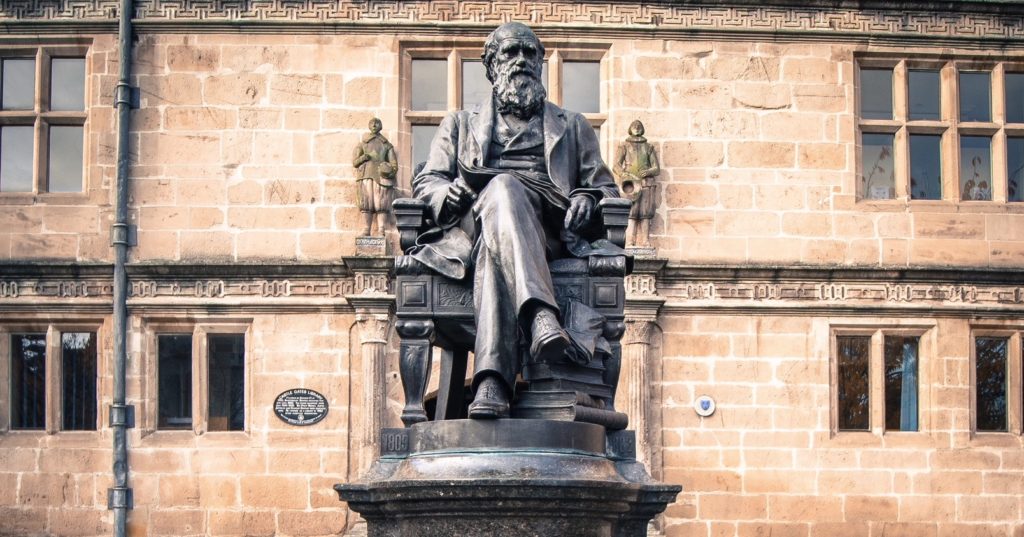 Evolution
Evolution
What We Can Learn from Darwin

We hear a lot of talk these days about “following the science.” What this usually means upon closer inspection is “follow my science.” Many would have you believe that there is one scientific conclusion cutting across all areas of opinion and belief, and to disagree with that conclusion makes the doubter “unscientific,” which means foolish, benighted, uneducated, etc. But science rarely speaks with one unified voice, and even amidst consensus there are no guarantees of accuracy — Galen’s humoral pathology in medicine, Georg Stahl’s phlogiston in physical chemistry, and Lord Kelvin’s universal æther in physics are notable examples.
With this in mind, we might actually learn a valuable lesson from Charles Darwin’s relationship with Alfred Russel Wallace. As I have pointed out many times, although both men are considered the co-discoverers of natural selection, Wallace came to disagree vehemently with Darwin over its nature and application.
For Wallace, evolution was intelligent, guided and detectably designed common descent. Darwin, of course, couldn’t have disagreed more. Even months after Wallace’s proclamation of an “Overruling Intelligence” to account for the special attributes of human beings, published in the April 1869 issue of the Quarterly Review, Darwin privately complained to his colleague, “But I groan over man — you write like a metamorphosed (in retrograde direction) naturalist, and you the author of the best paper that even appeared in the Anthropological Review! Eheu! Eheu! Eheu! — Your miserable friend, C. Darwin.”
Friends and Colleagues
They never changed their opinions, and they became even firmer in their respective disagreements. But more importantly, they remained friends and always considered themselves reputable colleagues.
There is no better proof of this than Darwin’s successful effort to obtain a civil pension for Wallace. By 1881 Wallace had fallen on hard times. A protracted legal dispute and poor business investments left him, in his biographer Ross Slotten’s words, “financially solvent only by means of makeshift employment.” Sales of his popular travel narrative, The Malay Archipelago (1869), had waned, and his application to become superintendent of Epping Forest, a position for which Darwin and his X-Club followers Joseph Hooker and John Lubbock had written letters of recommendation, failed.
It was Arabella Buckley, Charles Lyell’s personal secretary with whom Wallace had formed a close friendship, who first alerted Darwin to Wallace’s difficulties. Darwin thought a government pension might help, so he enlisted Hooker and Huxley in an effort to assist his friend. That effort paid off, and the letter informing Wallace of that fact is extremely revealing:
Down, Beckenham, Kent. January 7, 1881.
My dear Wallace, — You know from Miss Buckley that, with her assistance, I drew up a memorial to Mr. Gladstone with respect to your services to science. The memorial was corrected by Huxley, who had aided me in every possible way. It was signed by twelve good men, and you would have been gratified if you had seen how strongly they expressed themselves on your claims.
The Duke of Argyll, to whom I sent the memorial, wrote a private note to Mr. Gladstone. The memorial was sent only on January 5th, and I have just received a note in Mr. Gladstone’s own handwriting, in which he says: “I lose no time in apprising you that although the Fund is moderate and at present poor, I shall recommend Mr. Wallace for a pension of £200 a year.” I will keep this note carefully, as, if the present Government were to go out, I do not doubt that it would be binding on the next Government.
I hope that it will give you some satisfaction to see that not only every scientific man to whom I applied, but that also our Government appreciated your lifelong scientific labour.—Believe me, my dear Wallace, yours sincerely,
CH. Darwin
Science Becomes Ideology
Wallace was genuinely grateful. But can you imagine such a thing happening today?!
Wallace — a staunch proponent of intelligent evolution — was being lauded by those who fundamentally disagreed with him for his scientific accomplishments! At least in Darwin’s day differences didn’t lead to nasty, mean-spirited diatribes about being “unscientific.” There was, curiously enough, room for difference of opinion. How this healthy mutual respect was lost is a long story — but that it has been lost is a certainty. That cannot be good for honest, open inquiry because science then degenerates into rank partisanship. Science, in effect, becomes ideology. Then everyone loses.
